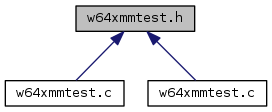|
FFmpeg
|
w64xmmtest.h File Reference
#include <inttypes.h>#include <stdint.h>#include <stdlib.h>#include <stdarg.h>#include <string.h>#include "libavutil/bswap.h"
Include dependency graph for w64xmmtest.h:

This graph shows which files directly or indirectly include this file:

Go to the source code of this file.
Macros | |
| #define | storexmmregs(mem) |
| #define | testxmmclobbers(func, ctx, ...) |
| #define | wrap(func) |
Macro Definition Documentation
| #define storexmmregs | ( | mem | ) |
Value:
__asm__ volatile( \
"movups %%xmm6 , 0x00(%0)\n\t" \
"movups %%xmm7 , 0x10(%0)\n\t" \
"movups %%xmm8 , 0x20(%0)\n\t" \
"movups %%xmm9 , 0x30(%0)\n\t" \
"movups %%xmm10, 0x40(%0)\n\t" \
"movups %%xmm11, 0x50(%0)\n\t" \
"movups %%xmm12, 0x60(%0)\n\t" \
"movups %%xmm13, 0x70(%0)\n\t" \
"movups %%xmm14, 0x80(%0)\n\t" \
"movups %%xmm15, 0x90(%0)\n\t" \
Definition at line 30 of file w64xmmtest.h.
| #define testxmmclobbers | ( | func, | |
| ctx, | |||
| ... | |||
| ) |
Value:
uint64_t xmm[2][10][2]; \
storexmmregs(xmm[0]); \
storexmmregs(xmm[1]); \
if (memcmp(xmm[0], xmm[1], sizeof(xmm[0]))) { \
av_log(ctx, AV_LOG_ERROR, \
for (i = 0; i < 10; i ++) \
if (xmm[0][i][0] != xmm[1][i][0] || \
xmm[0][i][1] != xmm[1][i][1]) { \
av_log(ctx, AV_LOG_ERROR, \
"xmm%-2d = %016"PRIx64"%016"PRIx64"\n", \
6 + i, av_bswap64(xmm[0][i][0]), \
av_bswap64(xmm[0][i][1])); \
av_log(ctx, AV_LOG_ERROR, \
" -> %016"PRIx64"%016"PRIx64"\n", \
av_bswap64(xmm[1][i][0]), \
av_bswap64(xmm[1][i][1])); \
} \
abort(); \
} \
initialize output if(nPeaks >3)%at least 3 peaks in spectrum for trying to find f0 nf0peaks
these buffered frames must be flushed immediately if a new input produces new the filter must not call request_frame to get more It must just process the frame or queue it The task of requesting more frames is left to the filter s request_frame method or the application If a filter has several the filter must be ready for frames arriving randomly on any input any filter with several inputs will most likely require some kind of queuing mechanism It is perfectly acceptable to have a limited queue and to drop frames when the inputs are too unbalanced request_frame This method is called when a frame is wanted on an output For an it should directly call filter_frame on the corresponding output For a if there are queued frames already one of these frames should be pushed If the filter should request a frame on one of its repeatedly until at least one frame has been pushed Return it should return
Definition: filter_design.txt:216
Definition at line 44 of file w64xmmtest.h.
Referenced by wrap().
| #define wrap | ( | func | ) |
Value:
Definition at line 70 of file w64xmmtest.h.
Referenced by blend_subrect(), DECLARE_ALIGNED(), ff_clean_intra_table_entries(), ff_fix_long_p_mvs(), ff_h263_pred_acdc(), ff_h263_pred_dc(), ff_h263_pred_motion(), ff_h263_update_motion_val(), ff_mpeg4_pred_dc(), ff_msmpeg4_coded_block_pred(), ff_msmpeg4_pred_dc(), find_new_headers(), main(), mpeg_decode_slice(), vc1_coded_block_pred(), vc1_i_pred_dc(), vc1_pred_b_mv(), vc1_pred_dc(), vc1_pred_mv(), vc1_pred_mv_intfr(), and wmv2_pred_motion().
Generated on Sun Sep 21 2025 07:00:53 for FFmpeg by
 1.8.11
1.8.11